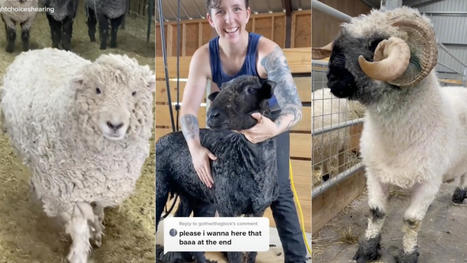Why is watching sheep-shearing videos so calming? Some of TikTok and YouTube's most popular shearers describe how and why their content brings viewers comfort.
Research and publish the best content.
Get Started for FREE
Sign up with Facebook Sign up with X
I don't have a Facebook or a X account
Already have an account: Login
 Your new post is loading... Your new post is loading...
 Your new post is loading... Your new post is loading...
|
|















From the biological response to grooming behaviors and ASMR response to three-minutes or less narrative arcs with the most charming participants, watching sheep shearing on TikTok is like a NatGeo Zen experience with Mr. Rogers. If you don't love Katie McRose after watching how lovingly she treats her sheep, something's seriously wrong. And what a treat to focus on a happy story! #positivemedia #mediapsychology #sheepshearing #TikTok